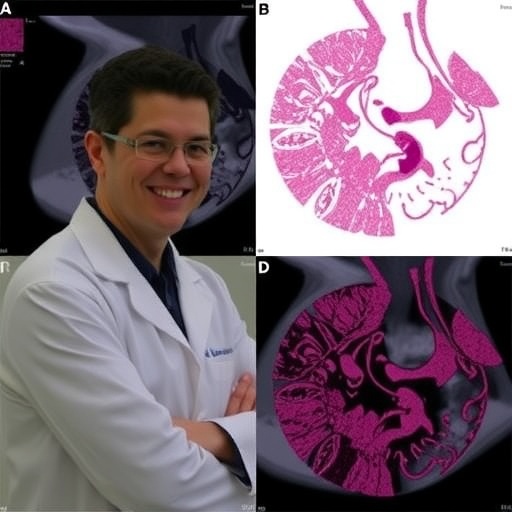Researchers at the University of California San Diego School of Medicine have announced a pioneering therapeutic strategy aimed specifically at triple-negative breast cancer (TNBC), a subtype notoriously resistant to conventional treatments and marked by aggressive progression. This novel approach involves an antibody-drug conjugate (ADC), a sophisticated and highly targeted delivery system engineered to transport potent chemotherapy agents directly to malignant cells expressing a distinctive surface protein. The precision of ADC technology permits the use of cytotoxic compounds too harmful to administer systemically, thus mitigating collateral damage to healthy tissues and offering a beacon of hope in the fight against formidable cancers.
TNBC represents approximately 10 to 15 percent of all breast cancer diagnoses and is characterized by the absence of estrogen, progesterone receptors, and HER2 amplification. These molecular features render TNBC refractory to the standard hormonal and HER2-targeted therapies that have benefited patients with other breast cancer subtypes. Compounding this challenge, TNBC often exhibits rapid metastatic potential and disproportionately affects younger women, Black women, and individuals harboring specific genetic susceptibilities, resulting in generally worse prognoses and lower overall survival rates.
Central to this breakthrough is the identification of FZD7, a cell-surface receptor implicated in the Wnt signaling pathway, which is overexpressed on cells endowed with high tumor-initiating capacity within TNBC tumors. These tumor-initiating cells, often referred to as cancer stem-like cells, drive tumor growth, resistance, and relapse. By engineering an ADC that selectively binds to FZD7-positive cells, the research team was able to deliver highly potent chemotherapeutics at the cellular level, substantially inhibiting tumor growth in preclinical mouse models without incurring systemic toxicity or damaging unaffected tissues.
The preclinical evaluation extended to sophisticated 3D cell culture systems, specifically mouse-derived mammary organoids, which simulate in vivo tissue architecture and microenvironment more faithfully than traditional monolayer cultures. In these organoids, cells expressing FZD7 demonstrated not only enhanced aggressiveness and tumorigenic properties but also pronounced sensitivity to the targeted ADC treatment. These observations underscore the therapeutic potential of eradicating tumor-initiating subsets within heterogeneous cancer populations, thereby attacking the disease at its root.
Complementing the in vivo and organoid data, the ADC demonstrated efficacy against multiple human TNBC cell lines, attesting to the translatability of the findings beyond murine models. This multi-tiered validation—from mouse models to organoids to human cancer cells—provides compelling preclinical evidence that targeting FZD7-positive tumor-initiating cells may be a versatile and effective strategy for treating TNBC.
Given the intrinsic heterogeneity and resilience of TNBC, the ability to selectively target a specific tumor-initiating population represents a paradigm shift in therapeutic development. Traditional chemotherapies commonly lack such specificity, leading to dose-limiting toxicities and incomplete eradication of cancer stem-like cells, which are often responsible for tumor recurrence and metastasis. The ADC approach developed by UC San Diego researchers elegantly overcomes these limitations, offering a promising path toward more durable remissions.
Future translational efforts will necessitate comprehensive safety and efficacy testing in clinical trials to confirm the ADC’s therapeutic window and to investigate its potential integration into existing treatment protocols. Furthermore, in-depth molecular characterization of FZD7 expression patterns across diverse patient populations will be critical for identifying candidates most likely to benefit from this targeted approach, emphasizing personalized medicine’s role in managing aggressive breast cancers.
Beyond TNBC, the implications of this research may extend to other malignancies sharing similar biological pathways and cellular heterogeneity. The concept of targeting tumor-initiating cells via specific surface markers and delivering cytotoxic payloads selectively may revolutionize cancer therapeutics, leading to broader applications across solid tumors and hematological cancers alike.
This study, published in the prestigious Proceedings of the National Academy of Sciences, reflects a collaborative effort driven by a deep understanding of cancer biology and innovative drug delivery systems. Supported by esteemed funding bodies such as the National Institutes of Health, The Mary Kay Foundation, and Curebound, this work exemplifies how translational research can catalyze the development of next-generation treatments for cancers that remain an urgent unmet medical need.
While further research is imperative to transition from bench to bedside, the discovery of FZD7 as a therapeutic target coupled with the ADC platform offers a hopeful horizon for patients grappling with TNBC. The meticulous engineering of this therapy underscores the power of precision medicine to selectively annihilate cancer cells with minimal adverse effects, ultimately striving for improved survival and quality of life.
UC San Diego researchers continue to explore the broader mechanistic underpinnings of FZD7 signaling and its role in tumorigenesis, seeking to refine and optimize targeting strategies. Additionally, investigations into potential resistance mechanisms to ADC treatment are underway, aiming to preemptively address challenges that could arise during clinical development.
In summary, this breakthrough reflects an elegant fusion of molecular oncology, bioengineering, and pharmacology to tackle one of breast cancer’s most intractable subtypes. By honing in on tumor-initiating cells with an innovative targeted delivery system, the UC San Diego team has opened a promising new chapter in cancer therapeutics, poised to transform the landscape of aggressive breast cancer treatment.
Subject of Research: Development of an antibody-drug conjugate targeting the FZD7 receptor on tumor-initiating cells in triple-negative breast cancer.
Article Title: [Not explicitly provided]
News Publication Date: [Not explicitly provided]
Web References: http://dx.doi.org/10.1073/pnas.2522465122
References: Proceedings of the National Academy of Sciences
Image Credits: Karl Willert/UC San Diego Health Sciences
Keywords: Breast cancer, Triple-negative breast cancer, Antibody-drug conjugate, Cancer stem cells, FZD7, Targeted therapy, Tumor-initiating cells, Cancer treatments
Tags: addressing disparities in breast cancer outcomesadvancements in oncological researchantibody-drug conjugate technologybreast cancer subtype characteristicsFZD7 receptor in cancer therapyimproving survival rates in TNBC patientsinnovative cancer treatment strategiesmetastatic potential of triple-negative breast cancermolecular features of triple-negative breast cancerovercoming treatment resistance in breast cancerprecision therapy for triple-negative breast cancertargeted chemotherapy delivery systems





